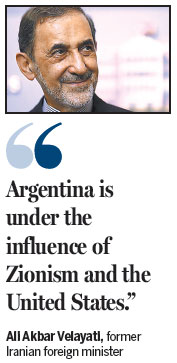Iran's role in 1994 Buenos Aires bombing dismissed by adviser
An adviser to Iran's supreme leader has dismissed accusations that he masterminded Argentina's worst terrorist attack, saying in an interview that he and the Islamic Republic are innocent.
Ali Akbar Velayati, who was foreign minister of Iran at the time of the 1994 bombing of the AMIA Jewish community center in Buenos Aires, is now an adviser to Ayatollah Ali Khamenei.
Former Iranian officials have been on an Interpol capture list for years, but Argentine prosecutors have never been able to question them. Iran has long denied any role in the unsolved bombing that left 85 people dead.
Velayati said in an interview with Argentina's C5N TV broadcast late on Monday that any claim that he masterminded the attack "is a baseless accusation, false - a lie".
"Argentina is under the influence of Zionism and the United States," he said.
When asked if he would be willing to go before an Argentine court, Velayati responded that there was no reason an Iranian official should have to respond to another nation.
Argentina struck a 2013 accord with Iran as a way to reach the truth behind the attack, but groups have criticized the deal, saying Teheran has failed to turn over bombing suspects. The joint "truth commission" was approved by Congress, but it has not been implemented because two Argentine courts ruled it unconstitutional. It is now under review.
Days before he was found dead on Jan 18, Alberto Nisman, the chief prosecutor investigating the case, accused President Cristina Fernandez of helping shield the Iranian officials allegedly behind the bombing. Federal judges have thrown out the case against Fernandez.
Mohsen Rabbani, the former Iranian cultural attache in Argentina, who also has been accused of involvement in the bombing and is wanted by Interpol, also was interviewed on Monday.
He questioned Nisman, the prosecutor, saying his investigation was based on "the inventions of newspapers without any proof against Iran".
Four months after his death, authorities have not determined whether Nisman took his own life or was killed by someone else. Conspiracy theories have flourished.
While some politicians and analysts believe that Nisman killed himself, because he felt that his claims against the president lacked proof, others say he was murdered because he was a threat to the Argentine and Iranian governments.



















